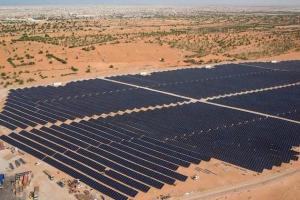
Mauritania has a gigantic potential of renewable energy resources, which resources represent the most important economic challenge facing the future of our planet. This makes of our country a privileged direction for international investors in the energy field.
Rich and diversified resources
According to official statistics, the solar photovoltaic (PV) potential is estimated, in all Mauritanian regions, at 2,000-2,300 kWh per square meter per year (kWh / m2 / year). Wind potential is also high, especially in coastal areas, with a peak wind speed of up to 9 meters per second (m / s).
Regarding hydroelectric power, Mauritania is a founding member of the Organization for the Development of the Senegal River, which has exploited significant hydroelectric resources since 2002 and is currently developing several electric dams in the same river.
In addition to the diversification and richness of these resources, Mauritania stands out for its vast areas, ready to be exploited for the creation of wind and solar parks, particularly in the north-west of the country.
Energy transition
In the context of the exploitation of these resources, the Mauritanian government began, in 2013, the energy transition to renewable energies, required at the global level, especially because of the new constraints of climate change. This transition has so far led to the inauguration of two solar power plants and a wind turbine, as well as the hybridization of several power plants with solar systems.
The total installed renewable energy capacity in Mauritania reached 168 MW, including 34 MW of wind resources, 86 MW of solar resources and 48 MW of hydroelectric resources. This capacity would have been doubled, with the finalization of a few current energy projects, mainly a 100 MW wind farm at Boulenouar in the Nouadhibou region.
Political commitment
Despite the achievement of these achievements, political commitment must require more efforts to accelerate the development of this sector, through the implementation of a detailed action plan, focused on results and equipped by the means necessary for its implementation.
This political will must also strengthen the capacity of the high-voltage electricity transmission network, to make energy, at the lowest cost, available to all industrial players, especially in mining areas.
The implementation of a strategy, based on the aforementioned factors, is capable of achieving the objectives of the energy transition, which essentially aim to achieve self-sufficiency in clean energy at the lowest cost.
The implementation of this strategy must take into account the primary role of the private sector, especially in the phases of manufacture and supply of equipment as well as the installation and maintenance of solar panels and wind turbines.
This strategy will undoubtedly also take into account the promising prospects of the green hydrogen project, which will open a new era of renewable energy and make our country a leader in the energy field on an international scale.




